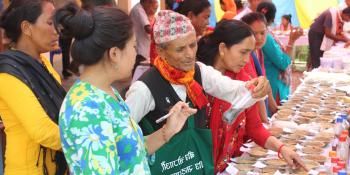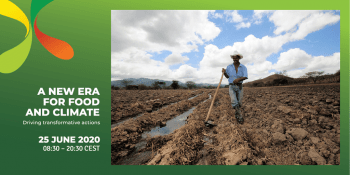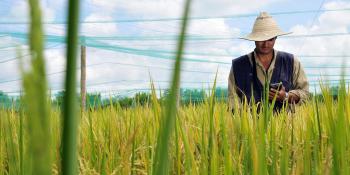Perceptions of climate change and agriculture in tribal Maharashtra

CCAFS South Asia together with the International Food Policy Research Institue (IFPRI) is working with partner organisations to understand how climate change and climate variability is affecting tribal communities and how they can cope by adapting their farming practices.
Maharashtra state in western India has the second largest tribal population. Most of these communities inhabit fringe forest settlements and degraded lands which have low productivity and high vulnerability to erosion. The socio-economic conditions are marginal, and such lands are invariably located in climatic risk-prone regions making agricultural production systems even more vulnerable and unstable.
These climatically challenged tribal hamlets are witnessing increasingly erratic rainfall, heat waves, sea water intrusion and other climatic risks. There is an imminent need to develop a comprehensive tribal development initiative which addresses multiple issues of tribal communities like livelihood security, food and nutrition security, enhanced capabilities including social and gender equity, reduced vulnerability and higher resilience.
CCAFS South Asia is working with partner organisations to understand how climate change and climate variability is affecting tribal communities and how they can cope by adapting their farming practices to future climate scenarios.
Focus group discussions
The International Food Policy Research Institute (IFPRI) together with CCAFS South Asia is working on scaling out climate-smart agriculture through policies and institutions - linking it with national agenda of food security.
Recently, researchers from IFPRI held a series of focus group discussions in Maharashtra to assess the awarness and adaptation potential of farmers in some of the districts.
With the help of agricultural officers, Block Technology Management of respective blocks, scientists from Agricultural Research Station centre, Palghar of Dr. Balasahab Sawant Konkan Krishi Vidyapeeth, Dapoli, and Krishi Vigyan Kendra, Kosbad have conducted focus group discussions in tribal dominant talukas like Palghar, Wada, Mokhada and Jawhar in Palghar district and Shahapur and Morbad in Thane district to understand farmers' awareness and their adaptation strategies towards climate change. The discussions also aimed to elicit their preferences and willingness to pay for climate-smart agricultural technologies suited to their landscape and environment.
The research team organised discussions with men and women farmers in each block. Farmers told us that changes in temperature and rainfall pattern have affected the crop yields and their livelihoods, but due to lack of crop advisories and technical and financial resources coping with such events is beyond their reach. They showed interest in adopting climate-smart-agriculture, especially, conservation agriculture practices, seeds, on farm water management structures and water-saving devices like drip and sprinklers.
Next step: processing the data
The research team is processing the data from discussions and based on this analysis, will select preferable climate smart technologies for the region. Following this, a household survey will be conducted to estimate farmers' willingness to pay for thes technologies.
Read more:
Brochure: Which climate-smart agriculture technologies are farmers willing to pay for?
Annual Report story: Market research for climate-smart agriculture: what farmers are willing to pay for
News reports from the recent trainings and focus group discussions
Economic Times
Business Standard
United News of India
Maharashtra Times
Md Tajuddin Khan is a research analyst with the International Food Policy Research Institute (IFPRI) in New Delhi, India. Paresh B Shirsath, CCAFS postdoctoral research fellow, contributed with inputs.
This blog was written by Dharini Parthasarathy, Communications Specialist, CCAFS South Asia



